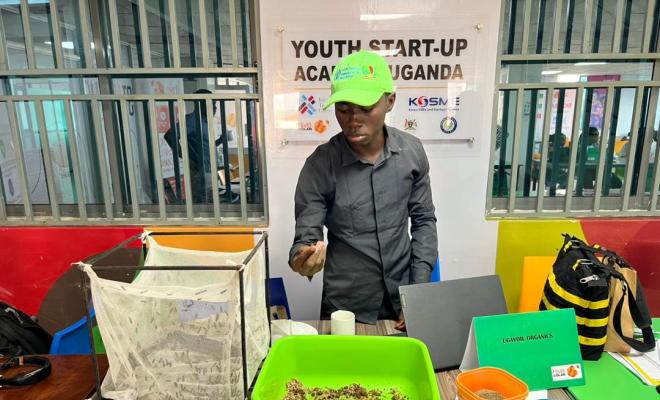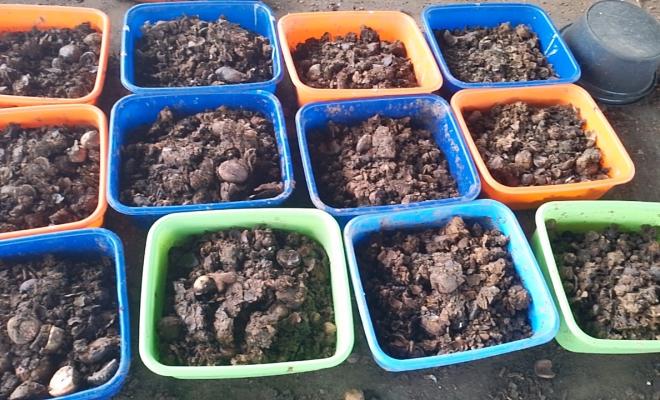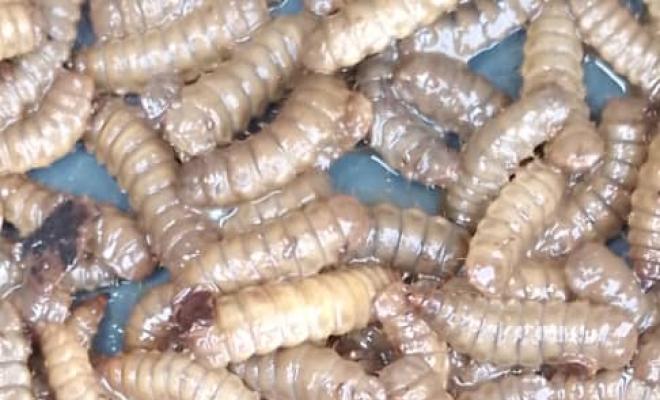Black soldier fly could offer a revolution for farming and waste management

Africa, with its diverse ecosystems and rich agricultural potential, faces a paradox. On the one hand, there is a tremendous amount of biowaste generated from agriculture. Approximately, one third of food produced globally is lost or wasted resulting in economic losses estimated at US$1 trillion annually. In Sub-Saharan Africa, 37% of 120-170kg per capita per year of all food produced is lost or wasted at various points along the value chain. At the same time, there is a constant search for sustainable solutions to mitigate climate change, rejuvenate soils, bolster food production, and provide people with healthy, nutritious diets.
Rapid urbanisation, industrialisation, and population growth have led to an exponential increase in waste generation, including food waste and organic matter. In 2016, Sub-Saharan Africa generated an estimated 174 million tonnes of waste at a rate of 0.46 kg per capita per day, and is projected to triple by the year 2050, making the continent the world’s fastest-growing waste-generating region by 2050. Organic waste currently constitutes up to 57% of total waste produced in Sub-Saharan Africa, with agriculture being one of the main sectors generating the largest quantities. If left unmanaged, this waste strains already-limited resources and contributes significantly to greenhouse gas emissions.
The opportunity for reusing, recycling and recovering waste for the African continent could inject—UNEP estimates—USD$8 billion annually into the economy. The diversion of waste is expected to improve the socio-economic status of the continent, i.e. by creating jobs in the waste-to-value sector. Moreover, the diversion would minimise the environmental and health impacts associated with the current poor solid waste management practices. The need for sustainable solutions that address both biowaste management and climate change has never been more urgent.
As Africa grapples with the challenges of sustainable agriculture, food security, and climate resilience, the black soldier fly offers a compelling solution. In this article, we delve into the potential of this unassuming insect and explore how Ugavoil, an agricultural enterprise in Uganda, is harnessing the black soldier fly to revolutionise the African agriculture landscape.
Black soldier flies: nature's clean-up crew
Native to many regions of Africa, the black soldier fly (Hermetia illucens) is a non-pest insect known for its remarkable waste-conversion abilities. With its voracious appetite for organic waste, rapid growth rate, and nutrient-rich larvae, this insect offers a multi-faceted solution to the twin challenge of biowaste management and climate change.
The black soldier fly (BSF) lays its eggs in decaying matter where the larvae, the true stars of the show, develop. As they feed, the larvae break down a wide range of organic materials, from food scraps to animal manure, agricultural residues, and even sewage sludge. These larvae convert the waste materials into two highly valuable resources for the agriculture sector: protein-rich larvae biomass and nutrient-rich residue or ‘frass’. The nutrient-dense biomass can be harvested and used as livestock or fish feed or converted into biofuels. Furthermore, the larvae themselves are a protein-rich food source, offering a sustainable alternative to traditional livestock feed. The second product, the nutrient-rich frass, can be utilised as a potent fertiliser, thereby replacing synthetic fertilisers that contribute to climate change through high energy consumption at manufacture, nitrogen oxide (N2O) emissions during usage, and soil health degradation and water pollution post-usage.

How is Ugavoil harnessing the black soldier fly?
Intellecap, through its project, ‘Reorienting the Private Sector to Enable Climate-Smart Agricultural Solutions to Address Gender Inequalities’, is working with ten private sector enterprises that have innovative climate-smart business models to use gender-transformative approaches to scale their businesses. One of the enterprises the project supports is Ugavoil Organic Products Limited. Ugavoil has two main business lines. It manufactures and sells edible oils made from oil seeds, including avocado, soybean, sunflower, chia seed, and sesame. Ugavoil has also partnered with the Kasese Municipal Council in Uganda to collect organic waste from the district, reducing landfills and greenhouse gas emissions by converting the waste into organic farm input and animal feed using black soldier flies. Ugavoil is using black soldier flies to revolutionise the circular economy in the Kasese part of Uganda:
a. Gender inclusion and employment creation: Using black soldier flies presents an opportunity to empower women across the agricultural value chain, from waste management to larvae harvesting, processing and distribution. Working mostly with women, Ugavoil trains women on how to sort and compost organic waste and use black soldier flies to generate organic products that can be used on farms and in animal feed. This empowers the local communities, supports women's economic empowerment, fosters economic growth, and contributes to achieving Sustainable Development Goals (SDG) 12 - Sustainable Consumption and Production; SDG 8 - Decent Work and Economic Growth; SDG 5 - Gender Equality; and SDG 13 - Climate Action. That said, it is critical to provide resources such as land, finance, training, and awareness campaigns to ensure women can capitalise on the opportunity to use black soldier flies in agriculture.
b. Biowaste to feed: The organic waste collected is channeled into a black soldier fly larvae production unit, where the black soldier flies mate to produce the larvae which in turn feed on the waste. Within weeks, these ravenous larvae reduce the waste by over 50%, and, in the process, they convert it to high-protein biomass. Once fully developed, these nutrient-packed larvae are also harvested themselves. The biomass and larvae become key ingredients in livestock and fish feed. These are sold to farmers in Kasese District, where Ugavoil’s production is currently located, reducing their reliance on traditional, resource-intensive proteins like soy and fishmeal. As a result, local farmers can access affordable and sustainable feed options, enhancing the productivity of their livestock and boosting rural economies. Rearing soldier flies is an efficient way to dispose of organic waste by converting it into livestock feed and other products: the freshly harvested larvae are processed into black soldier fly meal, which contains essential amino acids and fatty acids. Black soldier fly meal can potentially replace soybean meal as a poultry feed and can provide better amino acids. (Poultry feed based on soybean meal currently represents 60–70% of farmers’ production costs while the black soldier fly alternative is cheaper). Furthermore, a scientific study revealed that replacing soyabean meal with black soldier fly meal did not affect poultry’s feed intake, daily body weight gain, feed conversion ratio or the aroma or taste of the cooked meat.
c. Soil enrichment: Post-feeding, the frass left behind by the larvae acts as an organic fertiliser, which Ugavoil sells to the local farmers. Rich in nutrients, these nutrient-rich organic fertilisers provide a sustainable alternative to chemical fertilisers.
d. Carbon sequestration: By diverting biowaste from landfills, where it would decay and release methane – a greenhouse gas over 80 times more harmful than carbon dioxide – Ugavoil leverages the black soldier fly larvae to combat climate change significantly. Furthermore, reducing the demand for traditional animal feed can alleviate pressure on our fragile ecosystems and reduce the carbon footprint associated with livestock feed production.

Embracing change for a sustainable future
As we stand at the crossroads of waste management, sustainable agriculture, and climate change, the black soldier fly is a beacon of hope. Its ability to convert biowaste into valuable agricultural inputs, creates immense potential to transform economies, improve food security, and combat climate change. The case of Ugavoil and other research examples showcased in this article serve as a blueprint for integrating this innovative solution into the African agricultural landscape.
As stakeholders in the planet's future, we are responsible for championing sustainable practices. Ecosystem actors, such as investors and incubator programmes, have a significant contributions to make. Most waste-to-agriculture enterprises in East Africa, like Ugavoil are at their proof-of-concept stage or minimum viable product stage. Therefore, investors in business incubators and accelerator programmes could increase their funding into the sector. This would, in turn, enable these enterprises to scale their solutions through increased adoption of waste-to-agriculture solutions such as black soldier fly-based solutions.
More broadly, African governments, NGOs, research Institutes and the private sector – including entrepreneurs, farmers, and consumers – could collaborate to create an enabling environment for the adoption of black soldier fly-based solutions. This could include:
• disseminating credible information on results of existing efforts
• supporting research and training centres for waste-to-agriculture entrepreneurs and research and development more generally
• creating tax holidays or tax breaks for enterprises in the waste-to-agriculture sector and investment in waste-to-agriculture infrastructure to encourage adoption
• formulating and endorsing public policies and regulatory frameworks that incentivise and support sustainable agriculture and waste reduction.
Finally, the role of women in the adoption of waste-to-agriculture practices cannot be overstated. It is important to integrate gender perspectives into research, policies, programmes, and projects to address the specific needs, roles, and contributions of both women and men. This is why Intellecap is supporting Ugavoil and other similar private sector enterprises with relevant technical assistance to improve their business model to engage and reach more women actors in the food system while identifying new growth opportunities. This support has empowered Ugavoil with the requisite skills to attract gender-lens investors, tailor their marketing approach, and improve their field engagement practices. The waste-to-agriculture sector needs more initiatives to follow Ugavoil’s lead and accelerate their impact through gender mainstreaming.

